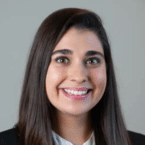
Abstract 3581: Multi-omic analysis identifies mechanisms of resistance to CD19 CAR T-cell therapy in children with acute lymphoblastic leukemia.
Oral Presentation Abstract LB062: Profiling of pediatric neuroblastoma reveals a dynamic and clinically significant tumor immune microenvironment.
What are your long-term goals?
My ultimate dream is to lead finding cures for childhood cancer as a pediatric oncologist. Following graduation from medical school, I will apply to research-focused pediatric residency programs, which will continue to build upon both my medical and graduate training and allow me to learn to ask and answer pertinent clinically relevant questions. Following residency, I plan to train in clinical and laboratory pediatric hematology-oncology through a clinical fellowship. I aspire to be a physician-scientist, bridging the gap between the laboratory and the clinic through translational research. Both my career goals and current work strive to understand the biology underlying pediatric malignancies and translate this understanding into the clinic through diagnosis, risk-stratification, and therapeutic target discovery. This will allow me to truly impact, not only human understanding of these devastating diseases, but the lives of my patients.
Please share information about how the pandemic has impacted your research over the last two years.
The COVID-19 pandemic has affected my research primarily through closures of the physical workspaces leading to lost research time and resources. Additionally, as my PhD is through the NIH Oxford Cambridge Scholars Program, I had to change which years of my doctoral work were at the NCI and at the University of Cambridge. Therefore, I adjusted specific aims and the experimental design of my thesis. I am fortunate to have two very supportive mentors (Dr. Javed Khan (NCI) and Prof. Richard Gilbertson (Cambridge) ), who helped me brainstorm ideas and figure out how to pivot. While certain aspects of lost research time are incredibly disappointing, I’ve learned a great deal about the importance of being flexible in science and how to quickly shift plans in response to unexpected results or circumstances.